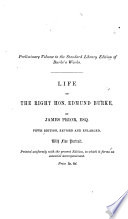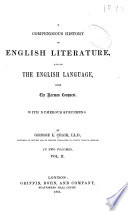 Thus, by preserving the method of nature in the conduct of the state, in what we improve, we are never wholly new; in what we retain, we are never wholly obsolete. Thus, by preserving the method of nature in the conduct of the state, in what we improve, we are never wholly new; in what we retain, we are never wholly obsolete.  Burke, Select Works - Seite 33von Edmund Burke - 1898 - 712 SeitenVollansicht Burke, Select Works - Seite 33von Edmund Burke - 1898 - 712 SeitenVollansicht - Über dieses Buch
 | sir Archibald Alison (1st bart.) - 1853 - 420 Seiten
...indubitable rights and liberties of the people of this kingdom." "By adhering in this manner," says Burke, "to our forefathers, we are guided, not by the superstition of antiquarians, but the spirit of philosophic analogy. In this choice of inheritance we have given to our frame of policy... | |
 | Sir Archibald Alison - 1853 - 448 Seiten
...indubitable rights and liberties of the people of this kingdom." " By adhering in this manner," says Burke, "to our forefathers, we are guided, not by the superstition of antiquarians, but the spirit of philosophic analogy. In this choice of inheritance we have given to our frame of policy... | |
 | Philip Smith Sparling - 1854 - 136 Seiten
...decay, fall, renovation, and progression. Thus, by preserving the method of nature in the conduct of the state, in what we improve we are never wholly new...wholly obsolete. By adhering in this manner, and on these principles, to our forefathers, we are guided, not by the superstition of antiquarians, but by... | |
 | Edmund Burke - 1855 - 632 Seiten
...decay, fall, renovation, and progression. Thus, by preserving the method of nature in the conduct of the state, in what we improve, we are never wholly new...; in what we retain, we are never wholly obsolete. By<adhering in this manner and on those principles to our forefathers, we are guided not by the superstition... | |
 | Thomas Hare - 1859 - 412 Seiten
...reorganised, are found to have the deepest roots. " By preserving the method of nature in the conduct of the State, in what we improve, we are never wholly new...antiquarians, but by the spirit of philosophic analogy."* "Our political * Burke, Reflections, &c., p. 49. system is placed in a just correspondence and symmetry... | |
 | Edmund Burke - 1860 - 644 Seiten
...decay, fall, renovation, and progression. Thus, hy preserving the method of nature in the conduct nf the state, in what we improve we are never wholly new ; in what we retain, wo are never wholly ohsolete. By adhering in this mann,r and on those principles to our forefathers,... | |
 | George Lillie Craik - 1861 - 580 Seiten
...decay, fall, renovation, and progression. Thus, by preserving the method of nature in the conduct of the state, in what we improve we are never wholly new...wholly obsolete. By adhering in this manner, and on these principles, to our forefathers, we are guided, not by the superstition of antiquarians, but by... | |
 | George Lillie Craik - 1862 - 578 Seiten
...decay, fall, renovation, and progression. Thus, by preserving the method of nature in the conduct of the state, in what we improve we are never wholly new...wholly obsolete. By adhering in this manner, and on these principles, to our forefathers, we are guided, not by the superstition of antiquarians, but by... | |
 | George Lillie Craik - 1863 - 564 Seiten
...decay, fall, renovation, and progression. Thus, by preserving the method of nature in the conduct of the state, in what we improve we are never wholly new...wholly obsolete. By adhering in this manner, and on these principles, to our forefathers, we are guided, not by the supe;stition of antiquarians, but by... | |
 | Hubert Ashton Holden - 1864 - 592 Seiten
...decay, fall, renovation and progression. Thus, by preserving the method of nature in the conduct of the state, in what we improve we are never wholly new...forefathers, we are guided not by the superstition of antiquaries, but by the spirit of philosophic analogy. In this choice of inheritance we have given... | |
| |